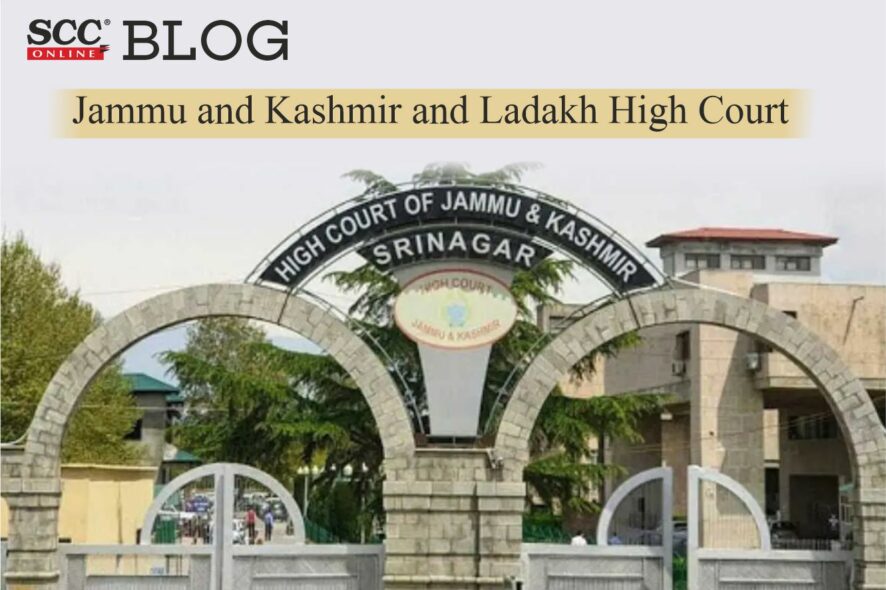Jammu and Kashmir and Ladakh High Court: While deciding the question raised in the instant petition that, whether the classification made on the basis of educational qualification for promotion, offends Arts. 14 and 16 of the Constitution; the Bench of Sanjeev Kumar, J., went on to reiterate the core principles of the concerned constitutional provisions and held that there should be left no doubt in the mind of anybody that the classification on the basis of educational qualification for promotion is permissible in law and does not offend Arts.14 and 16 of the Constitution.
Facts of the case: The petitioners, serving in Sher-i-Kashmir Institute of Medical Sciences Soura, Srinagar (hereinafter ‘SKIMS') as Staff Nurses, claimed to have rendered their services for the last 27 years. The petitioners were Matriculates and possessed 3 years Diploma in General Nursing and Midwifery. In 1998, SKIMS promulgated the Sher-i- Kashmir Institute of Medical Sciences Subordinate Services Recruitment Rules 1998 (hereinafter ‘1998 Rules') as per which no person was eligible for appointment or promotion to any post in any class, category or grade in the service unless he possessed the qualification as laid down in Schedule II of the Rules.
Later in 2014 via Government Order No.75-SKIMS of 2014, sanction was accorded to the modification of recruitment rules for various categories of staff working in the Institute. Regarding the post of Senior Staff Nurse, the afore-stated Government Order stated that post is to be filled up 100% by promotion from Staff Nurses possessing B.Sc. Nursing or M.Sc. Nursing degrees.
Aggrieved by the prescription of minimum qualification of B.Sc. Nursing provided for promotion to the post of Sr. Staff Nurse, the petitioners challenged the same on the ground that the classification made by the respondents between a Staff Nurse possessing three years Diploma in General Nursing and Midwifery and a Staff Nurse possessing the qualification of B.Sc. Nursing, violates Arts. 14 and 16 of the Constitution and therefore the same is not permissible.
Contentions: The petitioners contended that for about 27 years, they entertained a legitimate expectation that they would be promoted to the post of Sr. Staff Nurse in due course but, because of the impugned Government Order, laying down a modified criteria for the post of Sr. Staff Nurse, the petitioners have been deprived of their right to promotion for all times to come.
Per contra, the respondents relied on State of J&K v. Triloki Nath Khosa, (1974) 1 SCC 19, wherein classification on the basis of higher qualification being permissible under law, was settled by the Supreme Court.
Observations: Perusing the issue raised by the petitioners, the Court observed that the issue is no longer res-integra as the same has been settled by the Supreme Court in plethora of cases. The Court, however, deemed it appropriate to reiterate the interpretation of Arts. 14 and 16 as laid down by the Supreme Court from time to time-
-
Arts. 14 and 16 do not permit the State to treat un-equals as equals, for that is not the spirit of the principle of equality envisaged under the Constitution.
-
Art. 14 prohibits class legislation and not reasonable classification. To pass the Art. 14 test, classification needs to meet only two requirements: intelligible differentia and rational/ reasonable nexus between the intelligible differentia and object of the classification sought to be achieved.
-
The Court referred to the landmark decision in E.P. Royappa v. State of T.N., (1974) 4 SCC 3, wherein Justice P.N. Bhagwati had delineated the concept of permissible classification under Art. 14 stating that, “Art. 14 is the genus while Art. 16 is a species, Art. 16 gives effect to the doctrine of equality in all matters relating to public employment. The basic principle which, therefore, informs both Arts. 14 and 16 is equality and inhibition against discrimination”.
-
The Court considered the arguments raised by the respondents and agreed with them that the issue of classification on the basis of educational qualification in the matter of promotion, was set at rest by the Supreme Court in the afore-stated Triloki Nath Khosa case.
Decision: With the afore-stated observations, the Court dismissed the petitions and held that prescription of higher qualification like the qualification of B.Sc. Nursing/M.Sc. Nursing for promotion to the post of Senior Staff Nurse, is essential for efficient discharge of duties of a higher post. Thus, the respondents can surely prescribe higher technical qualification for the purpose of promotion.
The Court also held that a Staff Nurse possessing qualification of three years Diploma in General Nursing and Staff Nurses possessing qualification of B.Sc. Nursing, cannot be on par and therefore, are unequal because of their qualification. Which means that it would not be obligatory for respondents to treat these two unequals as equals.
[Hanifa Deva v. SKIMS, 2022 SCC OnLine J&K 528, decided on 05-07-2022]
Advocates who appeared in this case :
Arif Sikandar, Advocate, for the Petitioners;
M. A. Chashoo, AAG, Advocate, for the Respondents.
*Sucheta Sarkar, Editorial Assistant has prepared this brief






